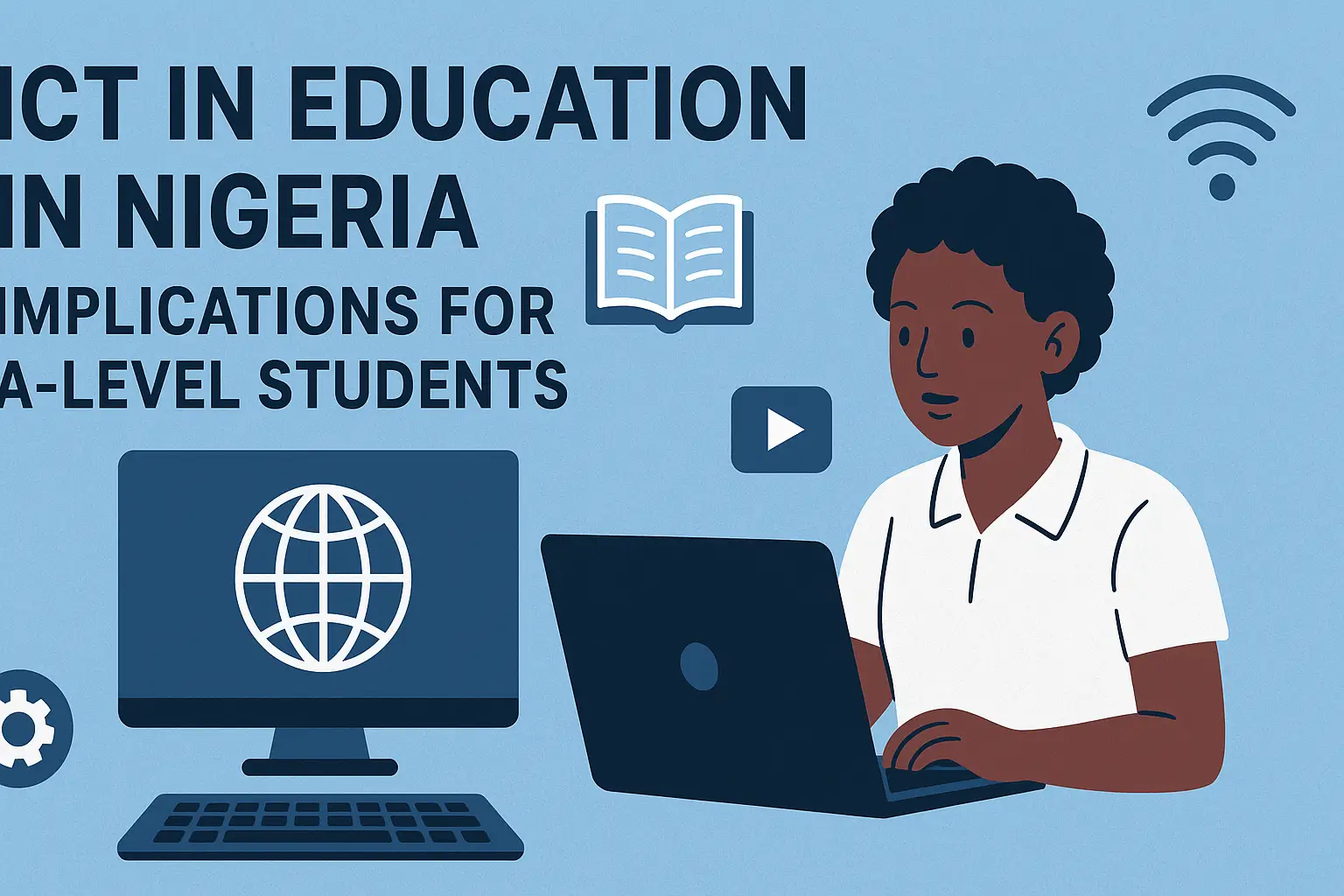
ICT in Education in Nigeria: Implications for A-Level Students
In recent years, Information and Communication Technology (ICT) has become an increasingly central part of educational systems globally. For students preparing for A-Levels in Nigeria, ICT offers both promising opportunities and serious challenges. This post explores how ICT is impacting A-Level education—what works, what doesn’t, and what must be done to maximize its benefits.
What is ICT in Education
ICT refers to tools and resources used to communicate, create, disseminate, store, and manage information digitally. In education, this can mean:
- Computer labs, laptops or tablets
- Internet access
- Educational software (simulations, learning management systems, etc.)
- Virtual classes and digital resources (e-books, videos)
- Assessment tools and platforms
For A-Level students, ICT’s role is heightened because they are preparing for high-stakes examinations and often need deeper subject understanding, critical thinking skills, and independent learning.
Benefits for A-Level Students in Nigeria
- Access to Rich Learning Resources
Digital libraries, online journals, video lectures, and past papers can supplement classroom teaching, helping students review complex topics, see multiple perspectives, and deepen their understanding. - Flexible Learning & Self-Paced Study
ICT allows students to learn at their own pace. They can revisit recorded lectures, pause videos, or use online quizzes to test understanding when convenient. This helps, especially where school timetables are crowded. - Better Collaboration and Peer Learning
Through online forums, messaging apps, and group-learning tools, A-Level students can collaborate across schools, share notes, mentor one another, and even get help outside school hours. - Preparation for University and the Workplace
Exposure to ICT builds digital literacy, which is increasingly required at university level. Skills like online research, typing, creating digital content, using software tools, and even basic coding are valuable. - Improved Assessment and Feedback
With ICT, assessments can be more interactive, feedback more immediate. For example, quizzes on learning management platforms can highlight weak areas, allowing students to focus their efforts.
Challenges Specific to A-Level Context in Nigeria
While the potential is high, several barriers limit what ICT can do for A-Level students in Nigeria:
- Infrastructure Gaps
Many schools (particularly public ones in semi-urban or rural areas) lack stable electricity, sufficient number of computers or devices, or reliable internet connection. Without these basics, ICT initiatives may fail. - Teacher Capacity & Training
Even where technology exists, teachers may not have been trained to integrate it effectively—either pedagogically or technically. Some may be uncomfortable with ICT, or lack continuous professional development. - Inequality & Digital Divide
Differences between urban vs rural schools, private vs public schools, and even household differences (availability of computers or internet at home) mean that some A-Level students benefit much more than others. - Policy, Funding, and Maintenance Issues
Even when national policies exist, implementation lags. Budget constraints affect procurement of equipment, maintenance, internet costs, or even replacing outdated tools. Corruption or misallocation sometimes compounds these issues. - Attitudinal & Resource Constraints
Some teachers or students resist change from traditional methods. Also, the cost of data, devices, or software may be prohibitive for many students. Time constraints (for example, balancing school, private tutoring, exam prep) can limit how much ICT-based study a student can afford.
What Can Be Done: Recommendations
To make ICT more effective for A-Level students in Nigeria, stakeholders should consider:
- Strengthen Infrastructure: Ensure access to electricity, reliable internet, functional computer labs. Government-private partnerships may help here.
- Teacher Training & Support: Regular workshops, incentives for teachers to adopt ICT methods, mentorship programs, and peer sharing of best practices.
- Ensure Equity: Subsidized or shared ICT access for underserved schools, community access centres, ensuring students have access at home or via school after hours.
- Improve Policy Implementation and Funding: Transparent budgets, maintenance plans, monitoring and evaluation of ICT initiatives, ensuring national policies are not just on paper but in practice.
- Blended Learning Approaches: Even when full ICT integration isn’t possible, using blended models (mix traditional + digital) can help. For example, using digital assignments, recorded lectures, or USB-based resources when internet is intermittent.
- Encourage Student Digital Literacy & Self-Driven Learning: Courses or modules to build students’ skills in using digital tools, doing online research, evaluating sources, and staying disciplined in self-study.
Real-World Examples / Case Studies
- A study in Lagos State found that although many secondary schools had initiatives to provide ICT resources, public schools often lag behind in maintenance and teacher training.
- Research on science and mathematics teachers in Nigerian senior secondary schools showed that poor infrastructure and teacher competence are major impediments to using ICT in those subjects.
- Theoretical work on tools like Google Classroom suggests they hold promise for improving academic performance, by enabling individualized learning inside and outside the classroom.
References
- Marafa, M., & Akintola, D. A. “Challenges Associated With Science Teachers’ Utilization of Information and Communication Technology in Nigerian Senior Schools.” AL-Hikmah Journal of Educational Management and Counselling. edu.ng
- “Impact of Information Communication Technology (ICT) on Students Academic Performance in Public Secondary Schools in Nigeria.” International Journal on Integrated Education, 2022. researchparks.org
- Emmanuel Adebayo Tolorunleke, Muhammad Muftawu Haruna, Rakiya Oiza Aliyu, & Momoh Jordan Danladi. “Impact of ICT Tools on Students’ Academic Performance in Nigerian Educational System: A Theoretical Perspective.” Premier Journal of Education, 2022. iapaar.com
- Oye, N. D., & Shakil, M. A. “The Use of ICT in Education: Focus on Nigeria.” Information Management and Business Review. AMH International
- Study: “Implementation of National Policy on Information Communication Technology (ICT) in Public Secondary Schools in Nigeria: Problems and Solutions.” Middle European Scientific Bulletin. academicjournal.io
- “Initiatives and Challenges in Information and Communication Technology in Secondary Schools in Lagos State.” Dataproject Nigeria. Data Project
- “Role of ICT in Nigeria’s Education System.” Disciplines.ng. Disciplines



